Betty Boothroyd speaks her mind on politics, Yorkshire and making history
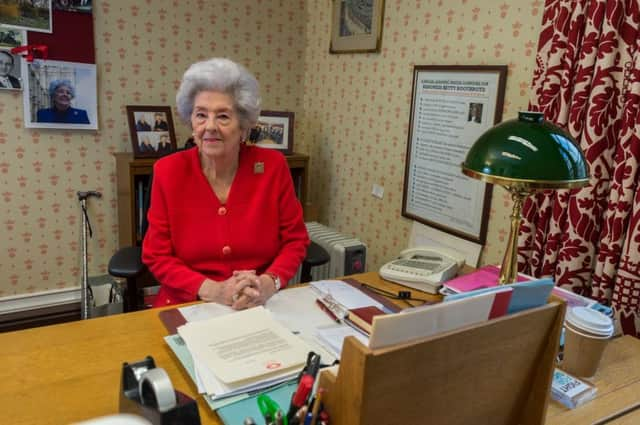

The first, and only, woman to be elected Speaker of the House of Commons, she’s still the indomitable force that she was in 1992 when she called MPs to order.
Why did she choose these four simple words?
“Because I am a simple soul. I think simple language. Telling language. And I think being from Yorkshire – we speak directly. Yorkshire direct. We speak direct. No nonsense,” she tells The Yorkshire Post in an exclusive interview to mark next Thursday’s political landmark before explaining how the Speaker is the servant of the House of Commons.
Advertisement
Hide AdAdvertisement
Hide Ad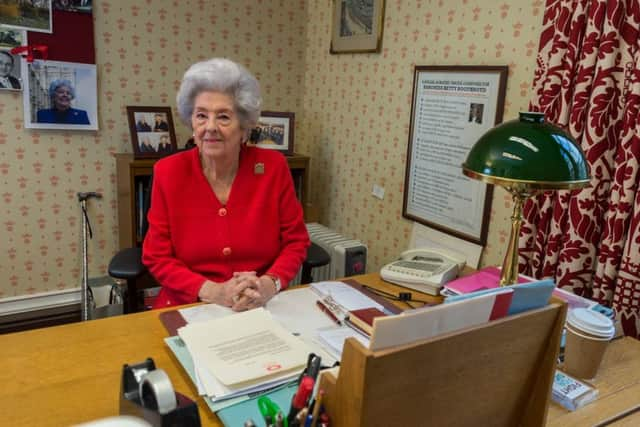

Born three days before the Wall Street Crash, Baroness Boothroyd, 87, remains as forthright as ever. She laments the conduct of last year’s EU referendum when Brexit campaigners were not required to set out clear plans and says she does not intend to leave the House of Lords until it is reformed.
She’s speaking in the compact Lords office that has been her Parliamentary base since her retirement as Speaker in 2000. When she stood down, she didn’t have a desk and, after a hiatus, she told the Serjeant at Arms that she would hold a press conference and tell the country how badly she had been treated if he didn’t act. The tactics worked.
She has no staff – just a trusty computer to complete the mountain of correspondence that she still receives. “I’m a DIY girl. I used to have a staff of 13. Now I’m DIY,” she declares before adding “you’ve got to be positive, not airy-fairy”.
Advertisement
Hide AdAdvertisement
Hide Ad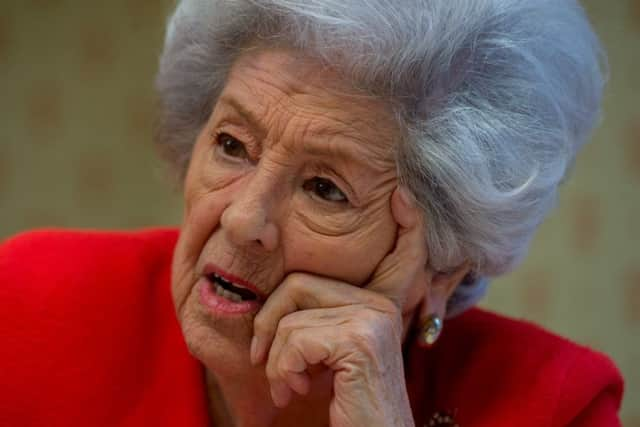

It’s this last remark which epitomises her journey from her family’s terraced house in Marriott Street, Dewsbury, where she was born in October 1929, to Parliament’s seat of power where she was held in such respect by all parties that she had the honour of becoming the first Opposition MP to be elected Speaker.
So often overlooked when she was striving to be elected to Parliament before winning a by-election in West Bromwich in 1973, this cross-party support – and enduring respect – meant as much to Baroness Boothroyd as her Speakership.
“Well I thought it was a real milestone for a woman to be elected Speaker of the House of Commons,” she said as she reflected on the groundbreaking events of April 27, 1992, when she defeated Tory grandee Peter Brooke.
“What else do you want me to say? It was a historic occasion and it was a very thrilling one. One of the things I said in my speech to MPs was elect me for what I am, not for what I was born. I am a great egalitarian, a considerable egalitarian. The implication is women are not as good as men, and they cannot cope.
Advertisement
Hide AdAdvertisement
Hide Ad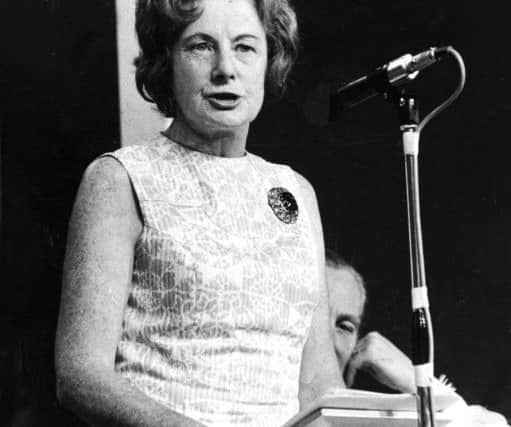

“I wasn’t sure at all if I would win – and I didn’t want to win by a handful of votes. I needed a big majority. I told myself ‘Just go for gold Betty. Just go for gold’. I went for gold. It’s tough, but you can win in the end. When elected, I couldn’t let down my own sex to start with and I couldn’t let the House down.”
Britain’s 155th Speaker, Baroness Boothroyd says there’s no formal training for the role, though a five-year stint as her predecessor Bernard Weatherill’s deputy helped. Her theatrical upbringing meant words like ‘Order, order’ never required rehearsal – she says it was an advantage that she always knew how to project her voice.
Yet, fearful that the Speaker’s traditional wig would distract her while undertaking this demanding role, she indicated that she would dispense with this heavy headwear before being advised that “you must remember you are a servant of this House, and not its master, and must seek its permission”.
Advertisement
Hide AdAdvertisement
Hide Ad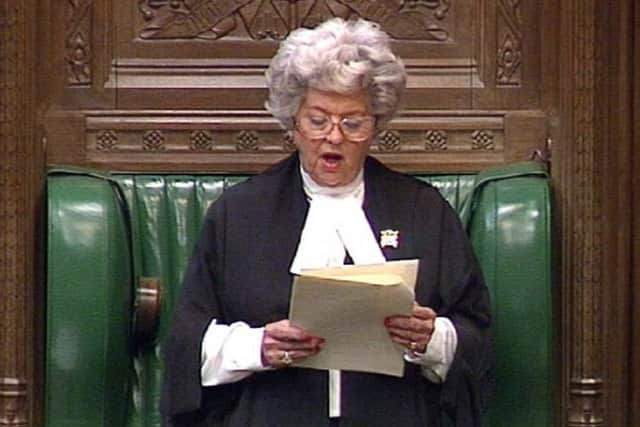

It is a convention that stems from 1642 when King Charles I entered Parliament to arrest five MPs for treason. Challenged about their whereabouts, Speaker Lenthall did not give any information about them, instead replying: “I have neither eyes to see nor tongue to speak in this place but as this House is pleased to direct me whose servant I am here.”
This precedent, says Baroness Boothroyd, served her well. Less helpful was the Speaker’s imposing green chair, a gift from Australia after the Commons was bombed during the Blitz. Too large for comfort – “it was so wide that I could get someone else in” – she placed a copy of the political bible Erskine May in the chair to help remain upright. “Me and Erskine May did very well in the chair,” she laughs.
Yet the then Speaker was never daunted by Prime Minister’s Questions. “I never wanted silence in the House. I never wanted a morgue. I wanted a debating chamber,” she says by way of explanation.
And her even-handedness was legendary. When a newly-elected Tony Blair unilaterally dispensed with twice-weekly PMQs in favour of one 30-minute session, she ensured the Opposition leader – then John Major – could ask six questions. Her mantra – “In a democracy, winners do not take all” – became a recurring theme.
Advertisement
Hide AdAdvertisement
Hide AdWhen she suspended the late Ian Paisley for un-Parliamentary language, the veteran Northern Ireland MP told her: “I got the front page of the Belfast Telegraph and you got page three.” She says she told him “Make yourself comfortable, I’ve never been a page three girl before or since” before he praised the Speaker for her gracious handling of the suspension.
When Sinn Fein’s Gerry Adams and Martin McGuinness wanted the full use of Commons facilities, despite refusing to swear Parliament’s oath of allegiance, she held firm and her stance was upheld by the courts. They had to be fully-fledged MPs – there was no halfway house.
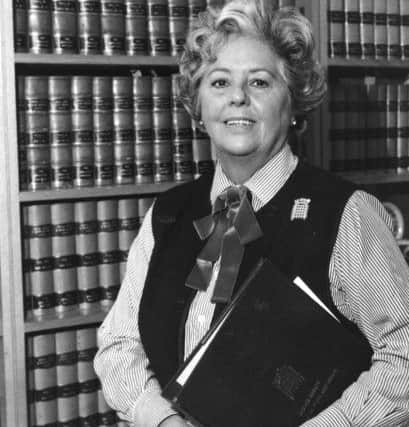

When they asked what they should tell the Press waiting outside, Baroness Boothroyd delights in recalling how she advised them: “You tell them exactly what I have told you. The fat old girl in there is immovable.”
Less stressful was South African president Nelson Mandela’s state visit – and how he had visited Westminster Hall in the early hours, unseen, to see for himself the tricky steps that they would have to negotiate together. She did not want him tripping up in front of thousands of people and a global television audience. “The occasion is engraved on my heart,” she says.
Advertisement
Hide AdAdvertisement
Hide AdYet there were times when the daily proceedings, receptions and rituals took their toll, often in early evening. The Speaker would quietly admonish herself in her state rooms, saying: “Oh Betty, put on a bit more Pollyfilla on, go downstairs and do the job.”
Though her childhood hero was Clement Attlee and she spent her youth attending rallies and becoming a crusader for compassion, her father, Archibald, had other ideas for his only daughter whose first job was at Bickers department store in Dewsbury. She had a fleeting dancing career before taking on a priceless apprenticeship working as a secretary to two MPs, one of whom was Barbara Castle.
She had failed her 11-plus and Betty Boothroyd remembers her father’s paternal careers advice: “He always wanted me to work in the town hall, especially the rates department. People would always have to pay their rates and he had been unemployed for a lot of his life. He wanted me to have a safe job where I wouldn’t be unemployed.”
She’s never forgotten the counsel she received at one election count from her mother, Mary. “She said ‘Oh never mind, win lose or draw, you’re still my daughter’. She didn’t mind if I was Miss Betty Boothroyd or Betty Boothroyd MP.”
Advertisement
Hide AdAdvertisement
Hide AdNow Baroness Boothroyd OM – she was appointed to the Order of Merit, an honour in the personal gift of the Queen, in 2005 – she has earned the right to speak out in her capacity as a cross-bench peer.
Though she has suffered some health setbacks and continues to be treated for cardiac ailments, this has not detracted from her duties in the Lords. There’s real anger in her voice when she laments how Leave campaigners did not have to make a coherent case during last year’s EU referendum and she wants legislation that would ensure all peers retired at no later than 80.
Until this happens, she will continue to campaign for meaningful Lords reform – the blueprint is 400 peers appointed from around the country to hold Ministers to account and the Prime Minister’s powers of patronage curtailed to stop cronyism. If new members were elected, she says it would undermine MPs. Will it happen? “Oh yes, I won’t give up until it does,” she warns.
A Parliamentarian like no other to the very end – and never afraid to speak her mind.